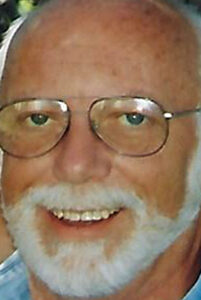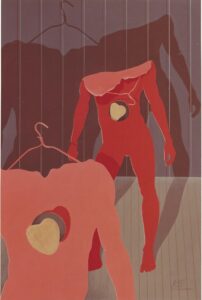Hello August! Like a closeted Republican politician, I have acquired a comprehensive knowledge of airport men’s rooms this summer, having traveled to the Bay Area for a family vacation. The San Francisco airport was actually a highlight of the trip. I was impressed not only with the food selections but the thorough commitment to recycling, composting, and phasing out single-use plastics. Water is sold in aluminum cans, and when you have to spill out your liquids to go through security, there’s a bottle refill station right at the other end so you don’t have to buy another one.
This NPR feature by Michael Copley, “Creating a throw-away culture: How companies ingrained plastics in modern life”, delves into the failed promise of consumer recycling and how plastics manufacturers always knew it wouldn’t solve the pollution problem. Even now, manufacturers are fighting regulations that would require sustainable packaging.
Synthetic plastic was patented in the early 1900s. It was known as Bakelite, and it sparked a boom in durable and affordable consumer goods. Soon, companies started selling different kinds of plastic. At first, most of it was marketed as sturdy and reusable. One television ad from 1955 — about a made-up homemaker named Jane in a made-up place called Plasticstown, USA — touts how plastic containers are ideal for families because they won’t break if kids accidentally drop them.
But soon, the messaging started to change. In 1956, the industry learned about a new way to boost sales — and profits. At the plastics industry’s annual conference in New York, Lloyd Stouffer, the editor of an influential trade magazine, urged executives to stop emphasizing plastics’ durability. Stouffer told the companies to focus instead on making a lot of inexpensive, expendable material. Their future, he said, was in the trash can.
Companies got the message. They realized they could sell more plastic if people threw more of it away…
…“It was a really difficult sell to the American public in the post-war period, to inculcate people into a throwaway living,” she says. “That is not what people were used to.”
A solution companies came up with was emphasizing that plastic was a low-cost, abundant material.
A 1960 marketing study for Scott Cup said the containers were “almost indestructible,” but that the manufacturer could still convince people to discard them after a few uses. To counter any “pangs of conscience” consumers might feel about throwing them away, the researchers suggested a “direct attack”: Tell people the cups are cheap, they said, and that “there are more where these came from.”
Barbie begs to differ: “Life in plastic, it’s fantastic”. Now she’s available in more inclusive styles. CBS News reports that “Mattel introduces its first blind Barbie, new Barbie with Down syndrome”.
The company worked closely with the American Foundation for the Blind (AFB) to ensure the blind Barbie doll accurately depicted individuals with blindness or low vision, while making sure that the doll was still accessible…
To that end, the doll’s fashions are tactile with a satiny pink blouse and a textured ruffle skirt with a brightly colored hook and loop fasteners for closure on the back of the doll’s top. The new doll even has accessible packaging with “Barbie” in Braille.
Accessories include a white-and-red cane with an identifiable marshmallow tip and includes stylish and functional sunglasses. The doll also reflects the sometimes-distinct eye gaze of a blind individual: facing slightly up and out.
In partnership with the National Down Syndrome Society, Mattel created a white Barbie with common physical characteristics of this genetic condition: “a rounder [face] shape, smaller ears, and a flat nasal bridge with her body also featuring a shorter frame with a longer torso and a single line on her palm”. This year they’ve added a Black version with “braided hair texture, one of the key features requested by the Black Down syndrome community.” She’s really charming!
Do you speak whale? Project CETI, a novel interdisciplinary collaboration among engineers, linguists, biologists, and machine learning experts, is discovering complex language patterns in the click vocalizations of sperm whales. Harvard Magazine reports:
In the past, sperm whale codas have been analyzed principally in terms of the number of clicks and the intervals between them. A representative discovery, for example, deemed in shorthand by the researchers as the discovery of a “whale phonetic alphabet,” as reported last September by a team at MIT, detailed detection of “fine-grained modulation of inter-click intervals relative to preceding codas,” as well as the addition of an extra click to existing codas, that changed depending on the context in which the whales were vocalizing. The researchers also documented independent changes in rhythm and tempo. When combined, these elements suggested complexity of the click communication that is an order of magnitude greater than previously suspected.
The paper generated tremendous excitement among the scientists because simultaneous work by Shafi Goldwasser had suggested that the more complex a system of animal communication, the more likely that a machine learning algorithm might succeed in translating the clicks into something humans could understand.
Then, in December, Project CETI’s linguist, Gašper Beguš, Ph.D. ’18, took the understanding of click complexity further, revealing the presence of acoustic properties in codas that are analogous to the vowels and diphthongs in human speech. Beguš, whose studies under professor of linguistics Kevin Ryan focused on animal communication, argued that the number of clicks and their timing correspond to human vowel duration and pitch, and that properties such as click timbre and harmonics correspond to the resonant frequencies formed by the human vocal tract in speech and song. These previously unobserved qualities and characteristics of click sounds, in the context of associated patterns of whale behaviors, Beguš wrote, appear not to be artifacts, but rather are under the whales’ control.
Read the whole piece to find out about the creative technologies they’re developing to monitor the communications and try to translate them.
In January, the humor magazine Cracked interviewed magician Penn Jillette about comedy, politics, and leaving Libertarianism behind. The Right’s turn toward conspiracy thinking, suggests Jillette, is a product of our craving for quick fixes and constant entertainment:
So much of trying to live our lives to do it right is tedious. And truth is very tedious…
Einstein comes up with this idea E = mc² — a profound, powerful, mind-blowing idea — and he has to work forever to make people understand that and to share that reality. Woodward and Bernstein are pretty sure the president of the United States committed crimes, and they work their asses off to try to prove that. But if you’re deep in the MAGA movement, you can just type that Biden went to China and set up a secret nuclear arsenal, and you get this incredible amount of praise with seven-minutes work.
…I don’t think we’ve ever experienced a time in human history where there wasn’t a shared reality, even if that reality was false. I’d rather everyone believed in Christianity than what it’s turned into.
We should always be striving to agree on what reality is. A bunch of people have decided that it’s easier and more fun to not worry about that part of it.
…What we do in live magic, it’s constantly dealing with that subject. Recreational epistemology is what stage magic is — we play around with that. And if you want to get heavy about it, you can say that every magic show is an exploration of how we determine what’s true.
When you do a live magic show, (lying) does not enter into it. A live magic show in Vegas cannot include deepfakes. It cannot include false news. Everybody in our theater must agree on the reality — it’s the reality they’ve been agreeing on since they were in the crib. Gravity, time, objects, persistence — it’s all we deal with.
In the March/April 2024 issue of Mother Jones, Madison Pauly reports how “independent” sexual abuse investigation firms prioritize damage control for the organizations that hire them, instead of justice for survivors. It’s painful but essential reading. The feature focuses on Tania Culver Humphrey, the daughter of a prominent missionary who co-founded Mercy Corps, a Christian humanitarian aid organization. She claimed that Mercy Corps knew and did nothing as he molested and violently abused her for many years. Then, when she sued them as an adult, bringing up additional evidence that he was part of a child-trafficking ring with others in the Mercy Corps network, the group commissioned a so-called independent probe as part of their settlement with her.
Mercy Corps hired Freeh Group International Solutions, a risk management firm run by former FBI Director Louis Freeh, to conduct a probe. Over the summer of 2020, the firm’s investigators grilled Humphrey, sometimes in full-day interviews, for about 100 hours, leaving her distraught and suicidal. Yet when the report was released the following year, it concentrated on the mishandling of her claims in the 1990s—something the organization had already acknowledged and apologized for. If the hired sleuths had uncovered any new information about the circumstances under which the abuse took place, Humphrey says she was never informed of it.
In September 2022, Humphrey, then a 51-year-old art teacher and mother of two, sued Mercy Corps. The lawsuit calls the probe a “whitewash” and alleges the organization used the process to gather information about potential threats to itself—of which she was one. Mercy Corps had “manipulated and deceived [her] to gain exclusive access to her explosive information,” and had used “systematic intimidation and bullying” and “the guise of an independent investigation” to control reputational damage, her lawsuit says.
Humphrey’s experience of betrayal is not an anomaly, according to the article:
Freeh helped define this line of work in 2011, when a task force of Pennsylvania State University trustees had hired him as a “special investigative counsel” amid the explosive revelations that former assistant football coach Jerry Sandusky had sexually abused young children for more than a decade. Many of the victims were participants in a charity for troubled youth that Sandusky had personally founded. Sandusky was charged with dozens of felonies, and two administrators were indicted for failing to report him.
Freeh’s mandate was to determine who at Penn State had been aware of Sandusky’s abuse, and when. The probe took eight months, included 430 interviews, and cost more than $8 million. When it was done, the task force waived attorney-client privilege, allowing Freeh’s team to publish its “essential findings.” Their report concluded that legendary head football coach Joe Paterno, university President Graham Spanier, and the two indicted administrators had concealed Sandusky’s child abuse, acting with “total disregard” for the victims amid a “culture of reverence for the football program.”
The report was widely seen as vindicating the board’s decision to fire Paterno. But it also generated endless debate about whether Freeh’s investigation was truly independent. In 2013, Spanier sued the Freeh Group and its founder for defamation, arguing the report had served the trustees’ interest by making him a scapegoat. Freeh had “developed a lucrative business model—predicated on Freeh’s name recognition and FBI credentials—that depends on conducting so-called ‘independent investigations’ and producing ‘investigative reports’ custom tailored with preconceived storylines to meet his clients’ objectives,” Spanier’s lawsuit claimed. The suit was ultimately dismissed, but the controversy continued…
Even as the field grows, there are few rules governing how independent investigators carry out their work…And there are virtually no resources available to help survivors understand what they’re signing up for when they agree to participate in a probe, making it hard for them to spot potential pitfalls—especially if they don’t have an attorney.
…Timothy Lytton, a Georgia State University law professor who has authored books on sexual abuse in the Catholic Church and the dynamics of self-policing industries, is mindful of the ways that companies can exert influence on a seemingly independent investigation, for reasons other than getting to the facts. Not only do institutions set the scope of the probes, they control what evidence they disclose to investigators. Lacking any subpoena power, he adds, investigators are “dependent on the information that they’re provided, which they don’t have any particular legal or economic muscle to ferret out.”
As Freud’s incest survivor patients could tell you, the person who pays the bills determines the narrative. I’m not sure what the answer is, but industry self-policing never works.






